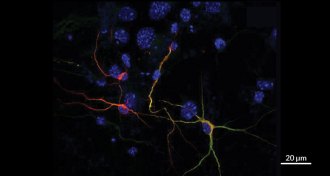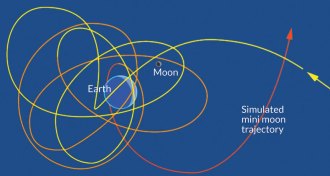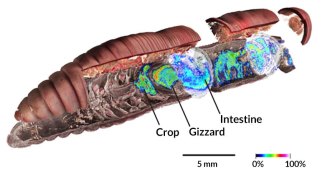News
-
 Animals
AnimalsPower of pupils is in their shape
Horizontally or vertically stretched pupils may provide predators and prey with visual advantages.
-
 Genetics
GeneticsAncestral humans had more DNA
A new genetic diversity map marks where humans have gained and lost DNA.
-
 Earth
EarthNepal quake’s biggest shakes relatively spread out
The seismic rumblings of the April 25 Nepal earthquake were mostly in low frequencies that are more likely to collapse large structures, new research suggests.
-
 Life
LifeChemical magic transforms skin cells into nerve cells
Just a few chemicals can transform skin cells from Alzheimer’s patients and healthy people into nerve cells.
By Meghan Rosen -
 Planetary Science
Planetary ScienceQuest to trace origin of Earth’s water is ‘a complete mess’
Understanding the origin of Earth’s water is hard enough, and it’s made harder by not knowing where all that water is hiding.
-
 Planetary Science
Planetary ScienceMini moons may zip around Earth
Mini moons may buzz around Earth, and they make great targets for space missions.
-
 Chemistry
ChemistryPlants’ ‘don’t-eat-me’ chemicals no problem for earthworms
Newly discovered gut compounds called drilodefensins allow earthworms to pack in plant debris loaded with hazardous chemicals.
By Beth Mole -
 Quantum Physics
Quantum PhysicsQuantum communication takes a new twist
A three-kilometer transmission of light above the Vienna skyline demonstrates that scientists can use the twistiness of light to encode delicate quantum information.
By Andrew Grant -
 Astronomy
AstronomyCosmic threads may hide some of universe’s missing matter
Half the normal matter in the universe might be hiding in cosmic threads strung between clusters of galaxies.
-
 Oceans
OceansOcean current simulations could narrow Flight 370 search
Aircraft debris found on Réunion Island in the western Indian Ocean could originate from the northern half of Malaysia Airlines Flight 370’s search area, ocean simulations show.
-
 Environment
EnvironmentDust components may promote obesity
Fat dust bunnies may contain obesity-boosting chemicals.
By Beth Mole -
 Climate
ClimateDesert dig uncovers caches of missing CO2
Irrigation water may wash significant amounts of carbon into groundwater systems beneath Earth’s deserts, researchers propose.